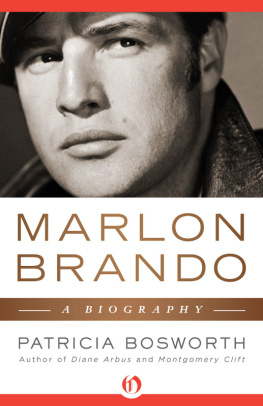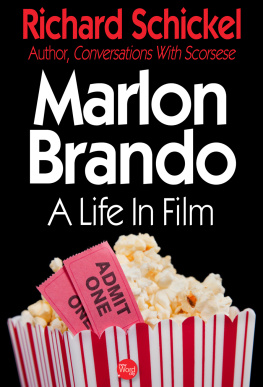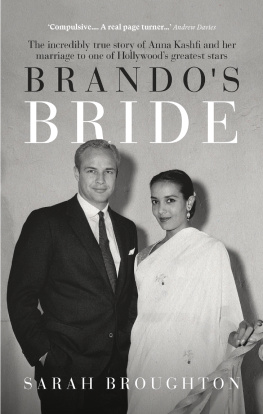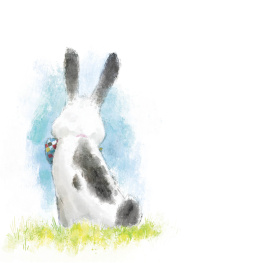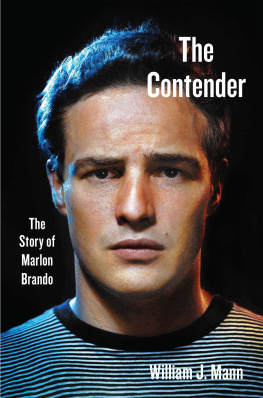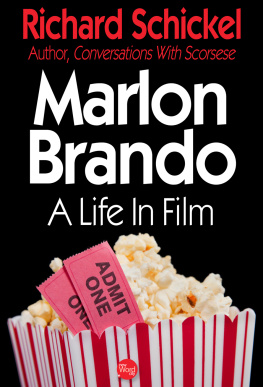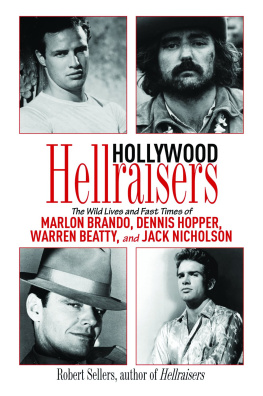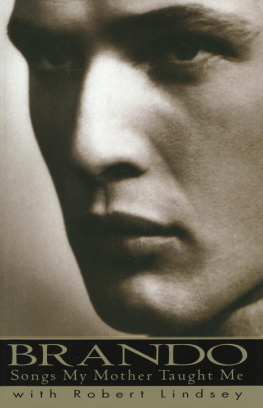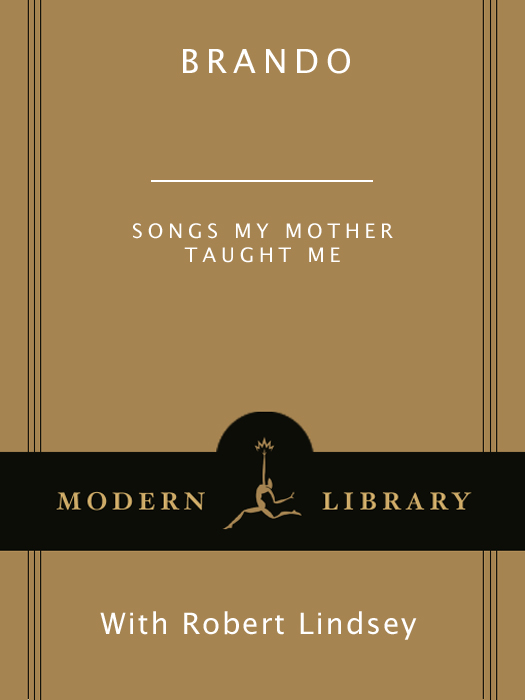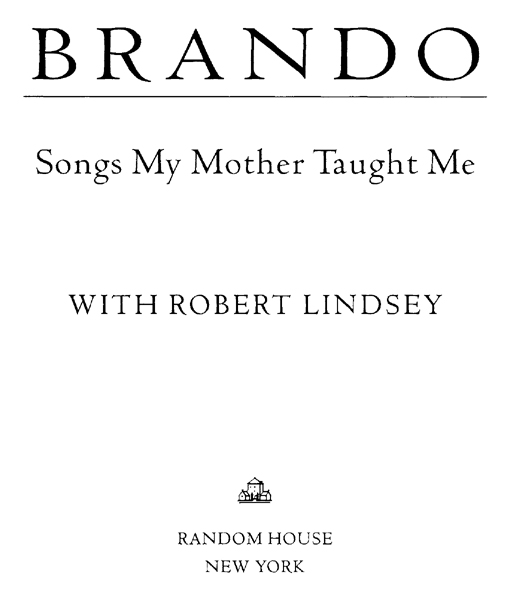Copyright 1994 by Marlon Brando
All rights reserved under International and Pan-American Copyright Conventions. Published in the United States by Random House, Inc., New York, and simultaneously in Canada by Random House of Canada Limited, Toronto.
PLAYBILL covers printed by permission of PLAYBILL Incorporated.
PLAYBILL is a registered trademark of PLAYBILL Incorporated, New York, N.Y.
Library of Congress Cataloging-in-Publication Data
Brando, Marlon.
Brando: songs my mother taught me / Marlon Brando with Robert Lindsey.
p. cm.
eISBN: 978-0-307-78673-9
1. Brando, Marlon. 2. ActorsUnited StatesBiography.
I. Lindsey, Robert. II. Title.
PN2287.B683A3 1994
791.43028092dc20
[B] 94-15281
v3.1
To my sisters, Tiddy and Frannie;
to G. L. Harrington, Clyde Warrior,
and Bobby Hutton;
and to my children, who brought me up.
Contents
INTRODUCTION
IN 1988 , I received a telephone call from an old friend, the wife of a Hollywood actor and a gifted writer and actress. She asked me if she could give my private telephone number to one of her friends, but didnt explain who it was or why. A few moments later, my telephone rang again and I heard a familiar voice say slowly: This is Marlon Brando.
It really wasnt necessary for him to identify himself. Like millions of people who had spent a sizable portion of their lives in a darkened motion picture theater, I recognized his voice. Like millions of other people during the past forty years, I had grown up with it.
He said he wanted me to write a book about a passage in his life during which he believed someone had terribly wronged someone he loved.
A few days later I arrived at a locked gate beside Mulholland Drive in Beverly Hills. The gate swung open, and I followed a winding road lined with pepper trees, uncertain where I was going. Then something almost ghostly happened: it seemed that a part of the forest of bamboo next to me began to move. A gap appeared in this leafy tangle as an electric gate, camouflaged with dense foliage, suddenly swung open. It might have been a wall of granite peeling open in an Arabian Nights fantasy.
The gap in the forest widened, inviting me not only to Marlon Brandos home at the top of a mountain, but into his life. After my first visit, I returned many times to the house on Mulholland Drive and he and I became close friends. We are an odd couple: I am a journalist with an ordinary past who has been married to the same woman for over thirty years and who, while reporting from Los Angeles as a correspondent for The New York Times, acquired a passionate disdain for the shallow and self-centered egotism and puerility that afflicts most movie actors I had encountered; he is an unconventional and reclusive actor who, after nearly fifty years of public life, despises the press, has had hundreds of women in his life and told me that he hadnt spent more than two minutes with any one of them.
Within twenty minutes of our first meeting, he had my shoes off, my belt loosened and my fingers wired to an instrument that measured my galvanic skin response, all the while explaining that it was a technique he sometimes used to get a personality profile of people by asking questions and observing the reaction of the meter. I was more puzzled than jittery. At our first meeting, I discovered that he was the most curious man I had ever met and that he felt uncomfortable, possibly even embarrassed, to be thought of as a movie star. The movies, he said, were the least important aspect of his life, a thought that he would repeat over and over. As a writer, I was accustomed to asking people questions, but he turned it around and bombarded me with endless questions about my family, my childhood, my marriage, my ideas. I felt as if I were being debriefed by a CIA interrogator. He was inquisitive about everything and informed about many topicsphysics, Shakespeare, philosophy, chess, religion, music, chemistry, genetics, scatology, psychology, shoe making, or whatever else he might suggest we discuss.
To my surprise, I learned that we had much in common, and our friendship deepened. The one thing that he didnt like to talk about was show business. He never touched on the subject unless I brought it up. We talked for hours at a timesometimes late into the night via long-distance telephone, other times sitting across from each other in the living room of his home overlooking the wide swath of the San Fernando Valley. Some of the conversations lasted until dawn and ended in his heated swimming pool or with the two of us amicably arguing about something in his superheated sauna.
I never wrote the book that was the topic of our first conversation. He began to change, and told me that he was beginning to see things in less polarized dimensions and that he no longer felt the need he once had to exact revenge on his enemies.
As curious as he was about me, he was remarkably candid about his own intimate thoughts, experiences and vulnerabilities, which initially made me suspicious, but I learned during the course of our friendship that it was genuine. At first he told me he intended never to write his autobiography: to make available his private musings to satisfy what he regarded as the publics prurient curiosity about a movie star, he said, would be crass and degrading. But over time, as he changed in other ways, his attitude about recounting the story of his life shifted as well. He had persuaded himself, he told me, that there were useful aspects in setting down the facts of my life, and he set about to write his autobiography for Random House. But after almost two years and little progress, he told me that he didnt have the emotional reserve to write a full-blown autobiography and asked me to help him. At first I declined. I said it was unwise for a journalist to deal professionally with a friend because it is impossible under such circumstances to maintain objectivity. But he promised to hide nothing, to be completely honest with me and to answer any questions I asked him about any topic I wanted except his marriages and his childrena promise he kept. I agreed to help him and began to make notes of our conversations, then to tape-record them. Our hours of talks stretched into days, then weeks. Inevitably, I told him, it would be necessary for him to talk about his experiences in films if he were going to tell the story of his life; he agreed, but with a reluctance that has never changed. He never relented, however, in his determination to say nothing about his children or his former wives, and he insisted that none of the other women in his life be identified in the book by their real names, except for a handful who are now dead. To do otherwise, he said, would be in bad taste.
Our conversations are the basis of this book, along with some of Marlons own writings and meanderings he has committed to paper. Ive taken the stories he told me, his writings, thoughts, reflections and experiences, and attempted to create from them a concise and accurate account of his life. Inevitably, in deciding on the structure of the book and selecting the words, events, metaphors and anecdotes in it, I have filtered the story of Marlons life through the prism of my own perceptions, experiences and interests. When the preliminary draft of the manuscript was finished, he edited and revised it to confirm its accuracy and then added additional recollections, observations and insights. He also decided what would remain in the manuscript and what would be omitted.


